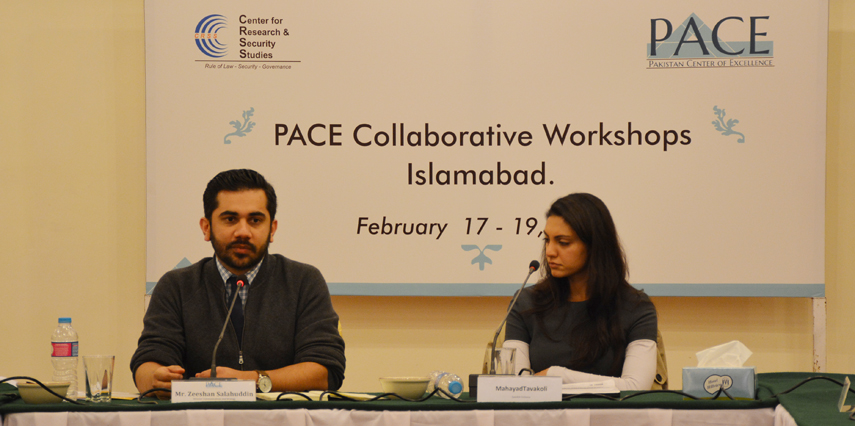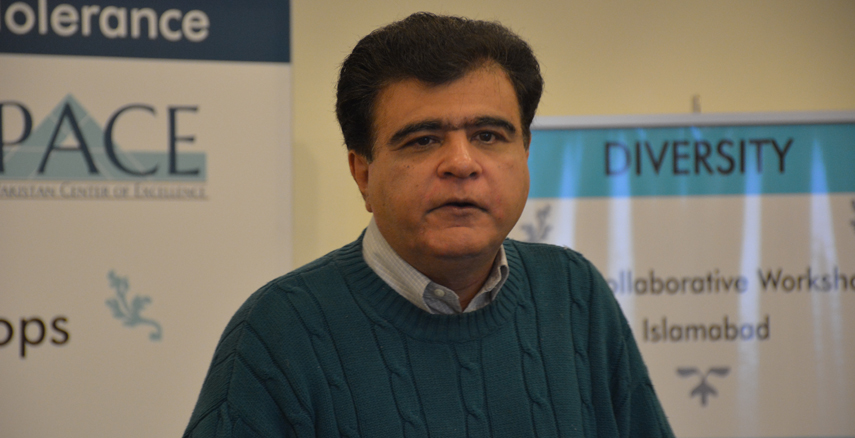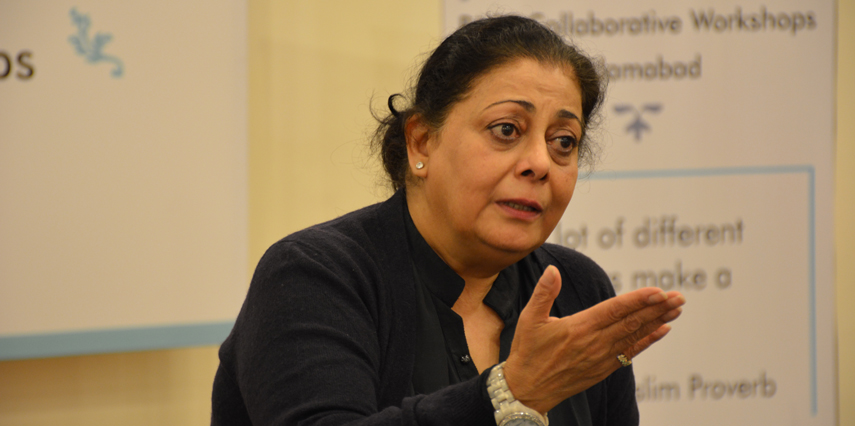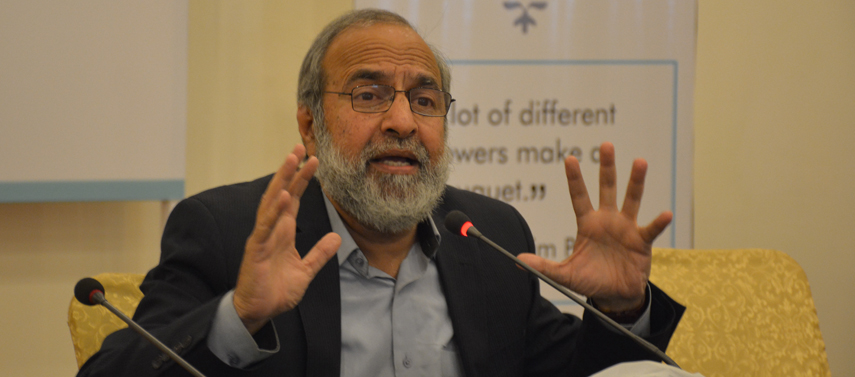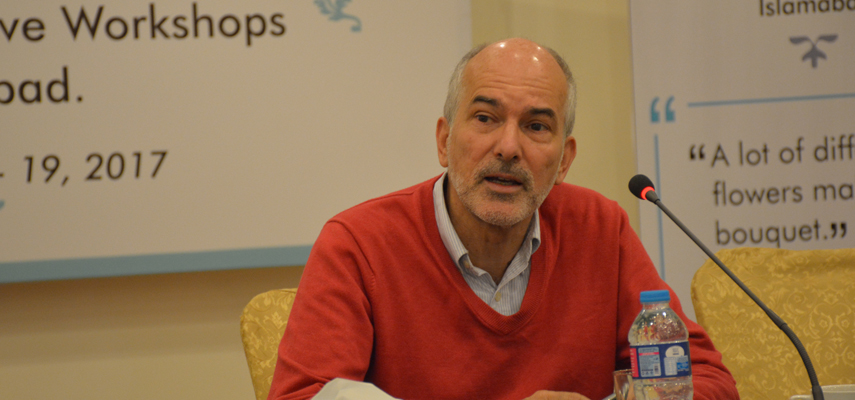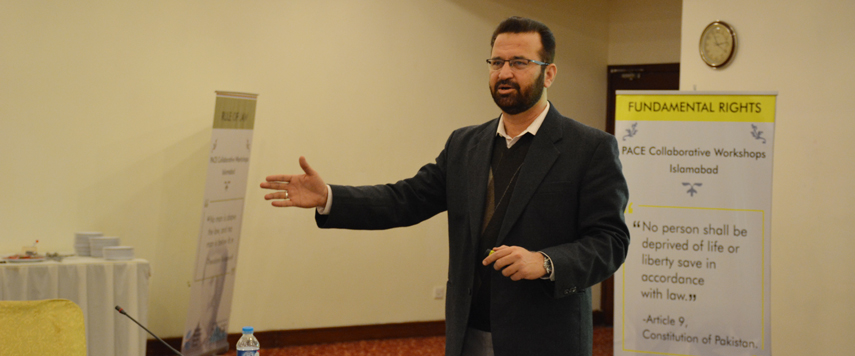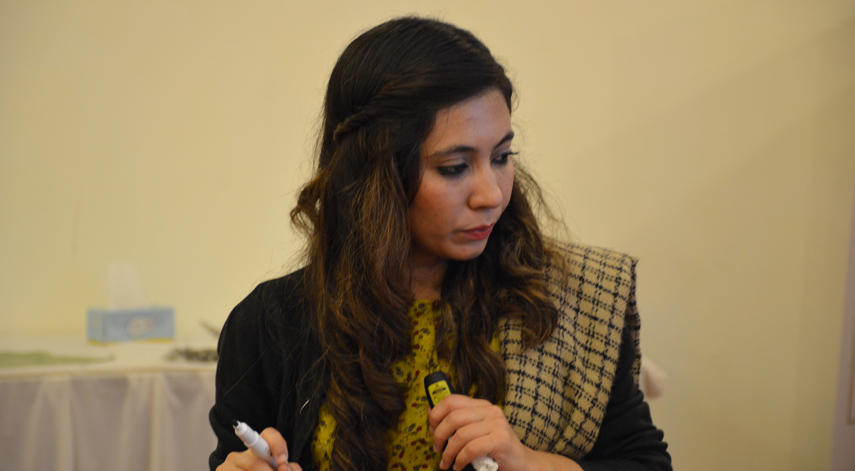The Center for Research and Security Studies (CRSS) conducted the 13th three-day PACE Collaborative Workshop for young university lecturers and professors from February 17 – 19, 2017, at Hill View Hotel, Islamabad. Participants included young lecturers and professors from Isra University, Jamshoro, University of Punjab, Lahore, Government Degree College, D. I. Khan, Ghulam Ishaq Khan University, Swabi, University of Engineering and Technology, Swabi, Islamia College University, Peshawar, University of Science and Technology, Bannu, University of Sindh, Jamshoro, Hazara University, Mansehra, Haripur University, Haripur, Gomal University, D. I. Khan, Karakoram International University, Gilgit Baltistan, University of Poonch, Rawala Kot, AJK, and Preston University, Islamabad.
Dr. Niaz Murtaza trained the participants on fundamentals of democracy, governance and accountability, Ms. Simi Raheal threw light on gender roles with special focus on media, Dr. Khalid Zaheer shared his views on religious intolerance. Mr. Charles Petrie, Former Deputy Secretary General of United Nations (UN) discussed the role and weaknesses of UN and international bodies in conflict mitigation and war prevention and Mr. Safiullah Gul, suicide attack survivor and Bureau Chief at Dunia News, Peshawar discussed leadership and motivation strategies with the participants.
OPENING CEREMONY
Mr. Zeeshan Salahuddin, Project Manager, welcoming the participants to the workshop said that the main purpose of inviting a diverse group from all across Pakistan is to gather a wide variety of spectrum from them. Teachers are the real gate keepers of the society because they are shaping future generations and are greatly influencing the lives of their students in multifarious ways. He said that PACE is an initiative by CRSS to counter radicalization, inculcate critical thinking, question preconceived notions and narratives, and embed a national discourse in constitutionalism and rule of law. He insisted on the role of teachers as gate keepers of future generations equipped with the universal values of adherence to rule of law, respect for diversity, opinions and rights, and ideas of perseverance, coexistence, peace building and tolerance.
Swedish Diplomat, Ms. Mahayad Tavakoli, was invited to the opening ceremony as chief guest. She shared her views on the multicultural society of Sweden, saying that she herself originally hails from Iran and serves as the deputy head of mission of Sweden in Pakistan. Sweden is the largest single recipient of asylum seekers in the European Union. As much as 6.5 to 20% population in Sweden is of foreign descend. In Sweden, society is de-personified and blindly bureaucratic entity. It has no interest in knowing about the ethnicity, culture or religion of its citizens and you don’t need to have any particular background to obtain Swedish citizenship.
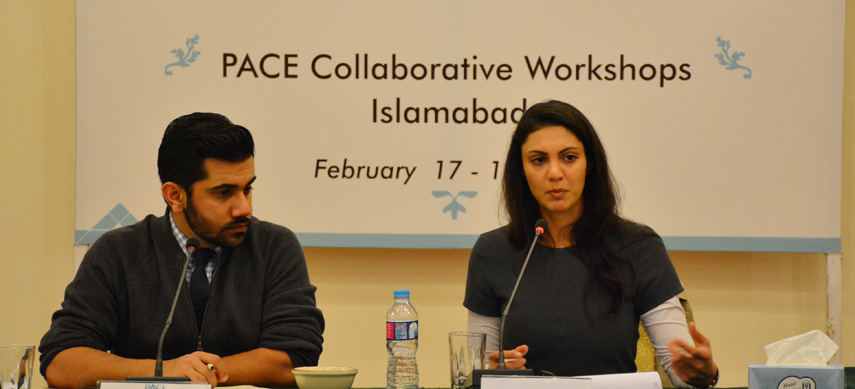
Sweden is based on two basic principles: 1) idea of individual citizenship (no collective rights) 2) idea of allowing individuals to define and redefine themselves without having the state monitoring this process. That is why state doesn’t register the ethnicity, culture and religion of its citizens. The state is to remain secular in order to not impose any dominant belief system on its citizens. The freedom of religion and forming cultural identity always emanates from the individual.
While responding to a question from one of the participants, Mahayad shared that “there are no collective rights but there is, of course, the idea of collective identity. Every culture is consisted of individuals. Sweden is quite secular and bureaucratic but the society is not. The idea of having a strong and secular state believes in defending the citizens from the passions of the mob or society. The society is very passionate, especially now, when this influx of refugees is coming and there is a sense of losing the Swedish identity.”
Another participant asked the willingness about political sanctions referring to the blasphemous material being published in Swedish print media. In response, Ms. Tavakoli said that “Swedish government doesn’t have any sanction system in the law; however, the government condemns such incidents.”
WORKSHOP CORE AREAS
The young professionals were trained in following areas:
- Leadership and motivation
- Equal citizenry and respect for rule of law
- Fundamentals of democracy, governance and accountability
- Respect for diversity, opinions and rights
- Rights of minorities and other marginalized groups
- Constitutionalism, and adherence to Pakistan’s Constitution, particularly articles 8-28
- The importance of asking critical questions in the pursuit of knowledge
Mr. Niaz Murtaza shared his views on the concept of democracy and good governance. He said a state has to go through a number of stages to reach good governance. No institution is stable at its initial stage, and same is the case with democracy. Democracy only delivers when it is mature and stable.
When we look back at the history of Pakistani politics, Pakistan has never been stable, he added. It could never see the fruits of a stable and mature democracy. There were ten changes of systems of governance since 1947 in 67 years, and 27 years of democracy and 40 years of authoritarianism. Pakistan was unable to see stable democracy where some fruits of democracy start to appear. Effective leadership emerge in those states which have strong people oriented institutions. He stimulated the discussion saying that in egalitarian societies stable institutions and leadership emerge. Egalitarian societies are the ones where people have equal access to education, capital, opportunities and freedoms. In such societies, strong institutions, able leadership and good governance emerge and development takes place.
Dr. Niaz responded to a question regarding unstable democracy, bad governance and dynastic rule in Pakistan that “the comparison was between democracy and dictatorship and democratic governments have always delivered much than that of dictatorships. Unless we have education and land reforms, we can’t reduce the poverty level. We had land reforms twice in Pakistan under Ayub and Bhutto but the later one was more comprehensive. Similarly, in the education department we can make abstract statements but we practically look at data about educational expenditures at provincial level, it’s never been as high as it is now in a democratic government. We need to focus on fundamental root cause strategy and what we need to strengthen is mobilization of people and social movements.”
He concluded the session saying that poor democracy is always better than the best dictatorship/authoritarianism. Dictatorial systems cannot flourish anymore in today’s world; it is democracy that can develop strong institution and effective leadership.
Ms. Simi Raheal, a senior TV artist and a development sector activist, spoke on gender roles in media. In today’s age, media has become the social conscience. It’s a slow process to deconstruct the preconceived ideas and develop more understanding of gender roles in a more liberal way.
She referred to a saying of Shakespeare that the entire world is a stage and all the men and women are merely players. He didn’t know that today’s world will turn into a theatrical world: sad, intense and volatile. All the roles we play from birth to death are assigned by the society. The people in the context of religion and tribal practices construct society.
We cannot separate sex from gender; sex is something which is biological and gender is something where we are assigned tasks and responsibilities and it is in context of the society. All the responsibilities assigned by the society are inter-changeable. Media has taken control of people’s lives so much so that they don’t even know and realize. Gender is not only about women. When you understand the balance between men and women, the productivity increases. We stereotype people in media; women are used as source of attraction. If you show it on TV, you give it the stamp of approval on it.
Language is the first sign of the evolution of mind, it can be positive as well negative. We need to control the negative language from our media by rejecting it, by not seeing and working for it. We need to understand how this language can impact the coming generation and assure not to promote it. Stereotypical language and negative behaviors can affect the importance of gender.
We are all human and, by virtue of that, we are equal citizens. Constitution is the supreme law of the land and it guarantees equal rights to all of its citizens and tells us about our fundamental rights. Law should deal with all citizens as equals irrespective of any discrimination on the basis of sex, religion, creed, cast or social status.
Dr. Khalid Zaheer spoke on the topic of religious intolerance. He said that religious tolerance is the right one should give to others to believe in and practice faith of their choice. We can’t impose our views on others and we can’t blame others for their beliefs and ideas. You can’t respect a view while strongly disagreeing with it but you can show tolerance towards it. When we say, we allow others to have religious freedom and we can’t impose our point on others genuinely, that is called religious tolerance. We have no right to impose our beliefs on others. Our attitude towards other’s beliefs should be genuine and positive. People usually believe in and practice ideas and beliefs what they have learnt from their elders or what they have been convinced by.
Islam teaches us not to use abusive language for other religions or faiths and respect them. If Islam says so, then why some Muslims are intolerant? There are a few arguments in front of them that are making them violent and intolerant. There is also a restrained religious setting which cuts people off the society and there is always confinement in communication. Questioning is not allowed in such environments and they make you blindly follow the ones who lead such groups. We need to get rid of such environments, groups and thinking that are leading us to extremism and a religiously intolerant society. We should not be violent towards the people who are not of the same faith as us. Everyone has the right to do whatever they want and believe. Being humans, we expect others to tolerate us; same is what they expect from us.
Dr. Zaheer responded to a question regarding the relationship between state and religion. He said, “State has to run its affairs purely democratically; it has to do all its business in accordance with what the mutual consultation process brings out. Therefore, it has got no business to impose the view of majority on minority. It should give opportunity to everyone to believe, speak, express, and to practice whatever they want to, within the limits of law.”
He further said, “The Quranic language is metaphorical in some cases; the reason is that language comes up with words only when there is a reality that needs to be described. Only the God knows real meanings. Quran has been declared as judgment of the God.”
He further said, “when it comes to the making of humans; there are two parts of it, 1) physical, 2) non-physical, which is the real part. It is housed somewhere inside the physical structure. The invisible part is injected the understanding of good and bad. We have been created independent and asked to take decision between right and wrong.”
Responding to a question regarding the use of intellect Dr. Zaheer said, “Humans have got five senses and these senses and outside world that these senses perceive is one part of the data that gets fed in. But there is more to it, God tells us even before we came to this world, there were certain things that were ingrained in our nature. God has gifted us with intellect and when we make use of our intellect properly, intelligently and honestly, we will hopefully come closer to each other in understanding of the differences.”
Former senior UN official, Mr. Charles Petrie shared his views on the expectations from UN and international organizations in Pakistan. He prompted the discussion by saying that the UN is basically the default response for conflicts which the international community is not interested in. The UN peace keeping has become a parody of what it was in the past. Without political will, you can do as much peace keeping as you want but it won’t work. He said that the UN has become a bureaucracy that delivers services in a very heavy way and that for him the UN has lost its way because the leadership has not been able to demonstrate its commitment to the principles of the organization.
He said, “the people in Pakistan have the potential to think differently and implement it in a unique way.” Perceptions of the west are fundamentally different because of the misunderstanding of what is happening in the country. Violence is the one thing that denies the people the right to live and leads to destruction. People can be traumatized with violence as part of the world politics. Oppression creates absolute despair.
He replied to a remark passed by a participant, “differences should open up a dialogue, instead of leading to violence and destruction. There are two points which are very important for survival i.e. struggle hard and never give up. This is the only thing which can keep people moving on with their lives.”
Mr. Safiullah Gul was the last speaker of the workshop and he spoke on the topic of ‘Leadership and Motivation’. He began with the saying that “he who fails to plan actually plans to fail” and shared stories of the people who alone have changed the course of history, with motivation and persistence, despite all the opposition.
He said that successful leadership determines the extent of efforts directed towards a certain goal. He presented his model of goal-seeking i.e. activation, persistence and intensity. Being alone doesn’t actually matter if you have goals and objectives set in your mind. To achieve these goals, you actually need to overcome your fears and insecurities. An individual sometimes can set an example and be motivation for others.
A participant commented that “We have to overcome our fear to achieve our goals in life.”
Another participant commented that “Motivation is always needed to move forward.”
His session, filled with activities to enhance creative and critical thinking, focused on looking at things from a slightly different perspective to encourage problem-solving.
Closing
Ms. Farhana Kanwal, Project Coordinator PACE, in her concluding remarks, insisted that there is a dire need to revisit the widespread preconceived notions that have been passed through our cultural values in the society over generations. Teachers, with the responsibility of imparting values to the young generation in educational institutions, are the most valuable engines that can challenge common negative narratives that promote hatred and bigotry. She said that teachers have the ability to shape an entire generation’s mindset to propagate tolerance, diversity and equality.
She shared that participants need to conduct these activities with their students to inculcate adherence to the rule of law and equal citizenry. CRSS provides financial and logistic support in this regard to lecturers and professors so that they can foster the universal ideals of tolerance and diversity in the young generations.

